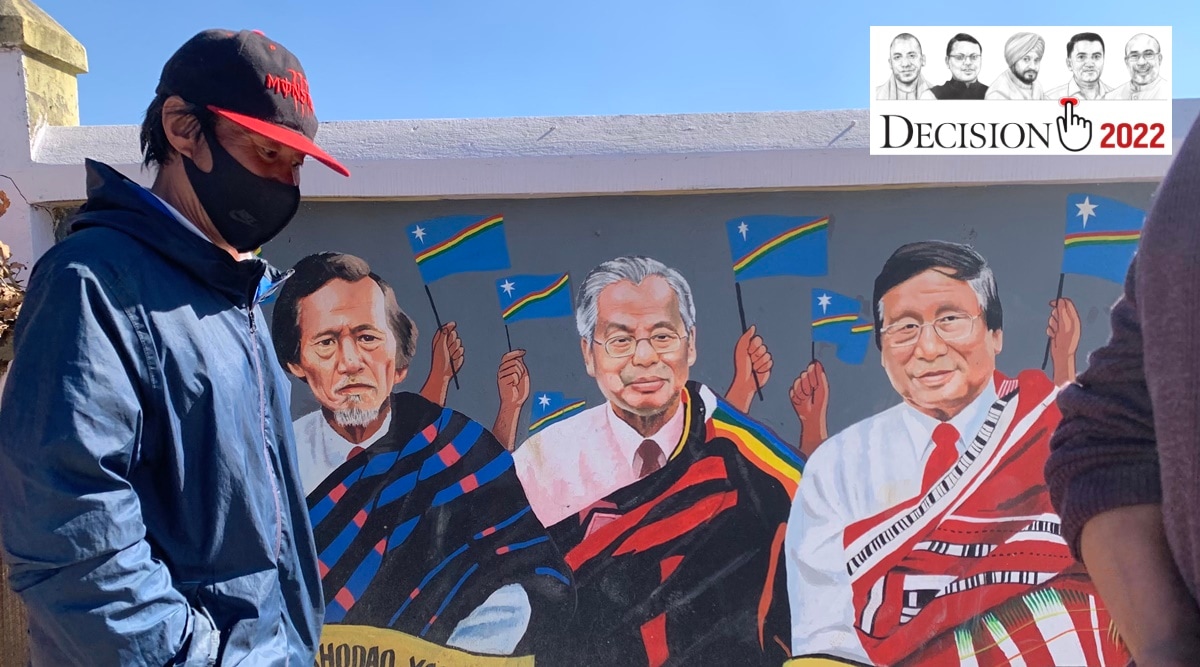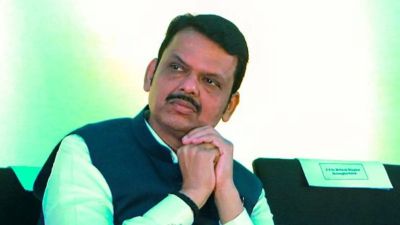In yet another Manipur election, AFSPA poll talk but not poll issue
While its repeal has long been a demand across the Northeast, it got a renewed push last December, after the death of 14 Naga civilians in a botched-up security ambush in Oting, Nagaland.
 A mural with the three big Naga leaders in Ukhrul, the site of a recent poll rally. (Express Photo by Tora Agarwala)
A mural with the three big Naga leaders in Ukhrul, the site of a recent poll rally. (Express Photo by Tora Agarwala)She may shy away from talking about politics, but mention the Armed Forces Special Powers Act (AFSPA), and Ukhrul’s Sopem Soyarpem Shangchiri has a thing or two to say. “It’s simple. AFSPA must go,” says the 24-year-old. “We have lost far too many innocent lives.”
Like Sopem, everyone in Ukhrul, the Tangkhul Naga heartland of Manipur, has a similar view on the controversial AFSPA, which gives sweeping powers to the armed forces to maintain law and order in ‘disturbed areas’.
 Map of Ukhrul
Map of UkhrulWhile its repeal has long been a demand across the Northeast, it got a renewed push last December, after the death of 14 Naga civilians in a botched-up security ambush in Oting, Nagaland. Its ripples were felt in Manipur too, home to a large population of Nagas. Three days after the incident, hundreds took to the street in Ukhrul’s Kranti chowk.
The far-reaching resonance of AFSPA is not lost on parties contesting the Manipur elections. Barring the BJP, all parties from the Congress to the little-known Kuki People’s Alliance (KPA) have AFSPA repeal on their manifestos.
But the people of Ukhrul say they know better. “Honestly, when parties put it on their manifesto, we make fun of it,” says an entrepreneur from Ukhrul town, who does not wish to be named. “Elections come, AFSPA (issue) comes, elections go, AFSPA also goes.”
While a state can recommend the repeal of AFSPA, it is the Centre that decides. “Ultimately there is only so much a state can do… So while we feel strongly about it, the issue takes a backseat when we vote,” she says.
Scarred by multiple insurgencies, Manipur has borne the fallout of AFSPA — whether the Malom Makha Leikai incident of 2000, where 10 civilians died in firing by the 8th Assam Rifles, or the killing and alleged rape of Thangjam Manorama in 2002, which led the “Mothers of Manipur” to protest naked in front of the historic Kangla Fort of Imphal.
A schoolteacher in Ukhrul recalls how when he was in Class 3, the Assam Rifles had opened fire near their school, allegedly leading to the death of a student. “Such incidents are rare now, but along comes an Oting, and suddenly it hits… it could happens to us too.”
 Ukhrul district
Ukhrul districtA Meitei civil society leader in Imphal says AFSPA may not be an electoral issue also because polls “pan out very differently in Manipur”. “They are shaped by the relationship with the candidate, money and muscle power,” he says.
Activist Irom Sharmila’s unsuccessful electoral foray in 2017 is an example. Ending her 16-year-long hunger strike in 2016, Sharmila had jumped into electoral politics under the banner of a new political party, People’s Resurgence and Justice Alliance (PRJA). She got barely a hundred votes.
Today, PRJA is still registered as a party, but is not contesting the elections. Its young activists hope to make a comeback. Leichombam Erendro, PRJA’s former convenor, says they lost because the electorate was “not ready” for issues like AFSPA yet. “Elections are not fought on concrete issues in Manipur… The electorate is more interested in freebies… And I don’t blame them… As long as poverty is a big issue, it will remain like that,” he says.
Erendro was incidentally detained last May under the National Security Act (NSA) for a Facebook post.
Others point out that whether it decides elections or not, it is welcome that AFSPA remains a talking point. Shimri Raising, president of the Tangkhul Katamnao Saklong, the apex student body of the Tangkhul Naga tribe in Ukhrul, says: “It gives an assurance to the public that the government has their interests, their aspirations in mind. Perception matters.”
At a recent rally in Ukhrul, the declaration against AFSPA by former Nagaland Chief Minister Shurhozelie Liezietsu of the Naga People’s Front (NPF) – a partner in the BJP-led government – was met with loud cheers.
Manipur has in all 11 Naga-dominated constituencies, with two of them in Ukhrul.
The hub of Naga politics, and also the home district of Thuingaleng Muivah, the general secretary of the NSCN (I-M), which is in talks with the government over the Naga dispute of 60 years, Ukhrul wears its Naga identity on its sleeve. Marking the boundary of the ground where Liezietsu held his rally was a large mural of Muivah, Isak Chishi Swu and S S Khaplang, the three leaders of the Naga movement. Behind them were miniature Naga flags. Behind them are miniature Naga flags, represented by a red, yellow and green rainbow, against a blue background, and the Star of Bethlehem.
It is the flag that has been a sticking point in the Naga talks since 2019. Closeby in his office, Raising says the Naga issue is “in their blood”. “AFSPA too, but the Naga issue is main,” he says.
That is why the NPF, which is a Nagaland-based party and has Naga issue and AFSPA as its main poll planks, has support in Naga-dominated districts. “Our main agenda is peace. One, the Naga solution should be reached at the earliest, and two, AFSPA should be repealed,” says Awangbow Newmai, president of NPF, Manipur.
Ironically, while there is anger against the ruling BJP over failure on both these, the party might be able to shrug it off due to its partnership with the NPF. Though they have not announced a pre-poll alliance, the two are expected to tie up after the results if this aids government formation.
“When the Narendra Modi government signed the framework agreement with the NSCN-IM in 2015, people were happy. But there has been no progress,” says the entrepreneur quoted above. Adds Raising, “The state government of Nagaland took a decision, passed a resolution against AFSPA. What did the Manipur government do? Nothing. At least, show there is an intent.”
At his office in Imphal, incumbent CM N Biren Singh doesn’t seem much bothered about AFSPA being an issue, perhaps on account of NPF backing. “People are not so bothered about AFSPA now. The relationship of the security forces with the public has become better,” claims Biren, who incidentally contested his first election, in 2002, on the plank of “fighting AFSPA”.
However, he is quick to add: “Having said that, repeal of AFSPA has been our government’s continuing demand, and will remain so.”
To Sopem, in her little village in Ukhrul, such assurances matter. Even if repair of the road to her village is what she actually cares about this election, there is no giving up on the Naga issue and AFSPA, she says. “I am a Naga. Of course, I care about it.”
- 01
- 02
- 03
- 04
- 05






























